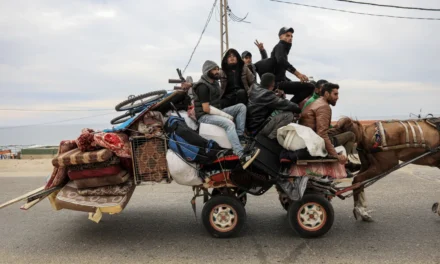Mohamad Torokman/Reuters
More than 1,000 European parliamentarians denounced Israel’s plan to annex parts of the occupied West Bank and Jordan Valley saying the move would be “fatal to the prospects of Israeli-Palestinian peace”.
The MPs representing 25 European countries urged leaders to prevent the annexation process and save the prospects of a two-state solution.
“Acquisition of territory by force has no place in 2020 and must have commensurate consequences,” the letter published on Tuesday said, urging European leaders “to act decisively in response to this challenge”.
The condemnation comes ahead of an important UN Security Council meeting on Wednesday focusing on the annexation move – the last international gathering to address the situation before it is expected to take place.
Beginning as soon as July 1, the government of Israeli Prime Minister Benjamin Netanyahu has said it will annex illegally built Jewish settlements in the occupied West Bank, moves detailed in a so-called “Middle East plan” proposed by US President Donald Trump in January.
“We, parliamentarians across Europe committed to a rules-based global order, share serious concerns about President Trump’s plan for Israeli-Palestinian conflict and the imminent prospect of Israeli annexation of West Bank territory,” the letter said.
“We are deeply worried about the precedent it would set for international relations at large.”
‘Permanent Israeli control’
Trump’s “plan” proposed the establishment of a demilitarised Palestinian state on a patchwork of disjointed parts of the Palestinian territories left over, not including occupied East Jerusalem.
The proposal has been rejected in its entirety by the Palestinians and widely condemned by the international community.
In their letter, the MPs also warned that Trump’s plan “promotes effectively permanent Israeli control over a fragmented Palestinian territory, leaving Palestinians with no sovereignty and giving a green light to Israel to unilaterally annex significant parts of the West Bank”.
In total, 1,080 members of national assemblies and the European Parliament from Austria, Belgium, Czech Republic, Denmark, Finland, France, Germany, Greece, Hungary, Iceland, Ireland, Italy, Luxembourg, Malta, the Netherlands, Norway, Poland, Portugal, Romania, Slovakia, Slovenia, Spain, Sweden, Switzerland, and the United Kingdom signed the letter.
Al Jazeera’s Harry Fawcett, reporting from West Jerusalem, said news reports suggest Israel’s annexation process will likely be carried out in phases.
“Nothing is really expected in terms of an immediate change on July 1. Under the Trump plan, Netanyahu believes he has the right to annex 30 percent of the occupied West Bank – that includes all the settlements and a large portion of the Jordan Valley,” said Fawcett.
“What has been talked about in recent days is not going for that full 30 percent and instead starting with areas close to East Jerusalem. It won’t make a big physical difference immediately, but many say it will be fatal to the two-state solution.”
US green light
Encouraged by Trump’s so-called plan, Netanyahu last month announced his government would formally annex the Jordan Valley and all settlement blocs in the West Bank.
The West Bank, including occupied East Jerusalem, is seen as occupied territory under international law, making all Jewish settlements there – as well as the planned annexation – illegal.
Palestinian officials have threatened to abolish bilateral agreements with Israel if it goes ahead with the annexation, which will further undermine the two-state solution.
Meanwhile, senior aides to Trump began discussions on Tuesday on whether to give Netanyahu a green light for his plan to annex settlements, according to a US official and a person familiar with the deliberations.
With Netanyahu’s July 1 target date approaching, the White House meeting included Trump son-in-law and senior adviser Jared Kushner, National Security Adviser Robert O’Brien, Middle East envoy Avi Berkowitz, and US Ambassador to Israel David Friedman, the American official told Reuters news agency.
Trump, whose support Netanyahu is counting on, did not participate, the official said, speaking on condition of anonymity. But US sources have said he could join later as this week’s deliberations continue.
Declare sovereignty
Under Trump’s proposal unveiled in January, it is envisaged the US would recognise the Jewish settlements – built on occupied land – as part of Israel.
Trump’s proposal put forward an idea for a Palestinian state under a broader “peace plan”, with strict conditions on it.
Among the main options under US consideration is a step-by-step process in which Israel would initially declare sovereignty over several settlements close to Jerusalem, instead of the 30 percent of the West Bank envisaged in Netanyahu’s original plan, according to a person close to the matter.
Trump has not closed the door to a larger annexation, but fears allowing Israel to move too fast could kill any hopes of drawing the Palestinians into talks on his “plan”, the source said.
Like Turkey and much of the international community, the EU does not recognise Israel’s sovereignty over the territories it has occupied since 1967.
 Demonstrators wear masks of Prime Minister Benjamin Netanyahu and Defence Minister Benny Gantz as they protest the annexation plan in Tel Aviv on Tuesday [Amir Levy/Getty Images]
Demonstrators wear masks of Prime Minister Benjamin Netanyahu and Defence Minister Benny Gantz as they protest the annexation plan in Tel Aviv on Tuesday [Amir Levy/Getty Images]














